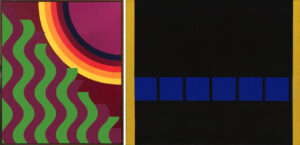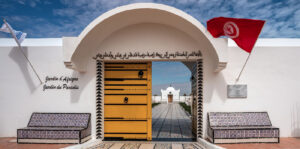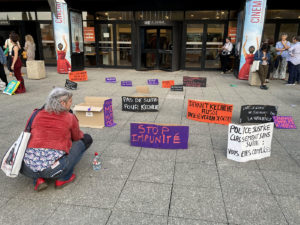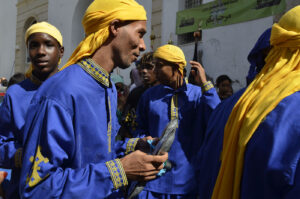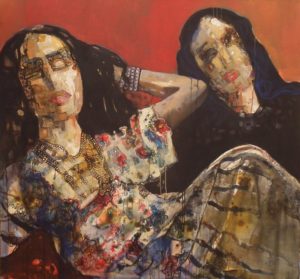Sometimes the savage plunges into dementia The month of March celebrates two events: International Women’s Day and International Francophonie Day. Although French is increasingly lost to Tunisian and English during the events, this month of celebration is conducive to questioning the role that this language has played since Tunisia’s independence in women’s mobilizations. Feminism and Francophonie cross paradigms linked to a colonial history legitimized by a civilizing mission. Historically, in Tunisia, the presence of French is associated with French colonization, as well as with the economic and diplomatic processes between the two countries. During colonization and in the aftermath of independence, French was used at the meetings of feminist movements such as the National Union of Young Tunisian Girls (1944) and the Zeitounian Girl’s Club (1954), or in public speeches by feminists such as Manoubia Ouertani in 1924 at one of the first feminist conferences organized by the French Socialist Party in Tunisia (for a history of women’s movements in Tunisia in the 20th century, see the book by Noura Borsali Tunisie: le défi égalitaire. Écrits féministes, Arabesques, 2011). It is interesting to note that French is still widely used more than 50 years after the country’s independence. Academic and journalistic articles written by feminists, as well as the public language chosen by many women’s associations, show that French is still a language of choice for the enunciation of feminism in Tunisia. How is it that feminism in African and Arab countries formerly colonized by France can only be thought of in, and through, this language? To overcome these quasi-romantic questions, it is necessary to distance oneself from any form of linguistic essentialism that confers on languages attributes of sexism, obscurantism, or even modernity and freedom. The complex history of the French-speaking world cannot ignore the ideological and political dimensions linked to its exercise. This requires a critical sociolinguistic point of view, taking into account the representations of the speakers and the heterogeneity of their practices. The imposition of the language is constitutive of acculturation techniques peculiar to French and British colonization. Today, the French-speaking world needs to be understood as an element of postcolonial (re)compositions of identity. The postcolonial work carried out by researchers from the new Arab generations in France certainly highlights new forms of imperialism in the use of French, but also exchanges and mutual support between feminist activists from the North and the South[1]. Several authors [2] show, for example, that the French language can be a tool of domination as well as emancipation. The French language is therefore not a language issue: it is a praxis that highlights economic stakes and inequalities in access to education, culture and knowledge. In Africa[3] and in some Arab countries, the French-speaking world is the theater of social distinctions; it is a space where class and race relations are played out, between educated and non-educated people. In Tunisia, the French-speaking world represents linguistic markets as much as national and transnational political strategies, articulated around the tension between a neo-liberal economic policy and a desire to build a modern nation-state. After independence, the Bourguibian project sees in Francophonie a necessary path to enter into “modernity”. The linguistic ideologies of modernity and of the universality of the French language have a particular historicity linked to the French Revolution. However, their resonance in the post-colonial period must be linked to the history of North-South circulation, made up of trade, migration, grafting and translation[4]. On March 8 last year, an event organized by the French Institute of Tunis — an organization that has been omnipresent in the Tunisian associative and cultural space since the flight of President Ben Ali — celebrated women over fifty years of age through a fashion show where the bodies of Tunisian women were contemplated by the attentive eye of an elite, including the French ambassador. Although the event was conceived as a space for the valorization of Tunisian women, it is not without reactivating a memory historically marked by the exhibition and exoticization of indigenous bodies. And through a dialogical effect, these images are part of a more general institutional process of subjugation and symbolic violence. The national narrative highlighting the “Tunisian exception” in women’s rights is based on concrete legal reforms, such as the prohibition of repudiation and polygamy, the right to abortion, divorce, child custody, and the right to vote. However, what has been described as “state feminism” is to be placed within a more global political movement of selective neoliberal modernization[5]. For state feminism is a project of social distinction that is the result of authoritarian economic and political choices. Also, since the 1970s, “state feminism” has permeated feminist struggles within militant collectives or associations, most often led by Francophiles. This is notably the case of the Tunisian Association of Democratic Women (ATFD). Often referred to as mainstream feminism, it has nevertheless played a crucial role in articulating feminist theories with left-wing political struggles. Several members, such as Ahlem Belhadj, who served as president of the Association, were affiliated with Marxist and trade unionist parties. ATFD privileged French in its various actions, particularly those related to the ratification of international human rights treaties. It has carried out several actions in popular circles and in rural areas, but always within the framework of a universalist feminism that is nowadays contested. This feminism, sometimes described as “White”, conceives of the struggle for women’s rights as a monolithic movement against patriarchy. As such, it is opposed to a decolonial and “intersectional” feminism, which takes into account the different forms of domination (racial and colonial, in particular[6]) and the specific identities of those who experience it. Although ATFD is not a homogenous bloc and encompasses a diversity of ideological approaches, the Association is nevertheless characterized by a general tendency to impose “emancipatory actions” that do not always take into account the agentivity of those concerned. In July 2019, on the occasion of its 30th anniversary, the association organized a summer university, to which a personality known for his Islamophobic positions was invited, provoking the disapproval of a large number of young activists of the intersectional movement. In Tunisia, the choice of language is not a simple language habit related to feminist associations. It is to be understood through the prism of a historicity of feminist movements that have defined themselves in the continuity of a western corpus of the second wave based on a materialist struggle against male domination. It is not a question here of opposing the use of languages, all of which are traversed by reproductive mechanisms of power, but of taking an interest in the conditions and effects of their use. One can wonder in particular about the consequences in the feminist associative field of the imposition by donors of templates written in French or in English. The mastery of these two languages becomes an implicit condition to obtain funds from international NGOs, excluding from the outset women’s groups from the working classes[7]. These technical skills also lead to a “professionalization” of women’s associations, and have an effect on the autonomy and collective identity of their members, especially since the revolution of 2011, with the increasing liberalization of civil society organizations. These language practices participate in maintaining the potential resources of feminism in elite spheres and therefore distance them from more encompassing issues such as the violence of the repressive apparatus of the state that is exerted on all bodies, men and women. One can also wonder about the effects of the Francophonie in the reception of feminist speeches expressed in Arabic. We note here the exclusion of many feminists from the Arab world such as Bahithat al-Badiya, Huda Shaarawi, Jamila Bouhired, Nawal El Saadawi, Fatima Mernissi, Fadwa Touqan or Nazik al-Malaika, and their militant, academic or literary writings, but also the absence of a host of young women researchers whose work related to gender in Arabic is excluded from intellectual and militant spaces. More generally, the standardization of French as a language of feminist expression shows a lack of questioning of the reproductive mechanisms of power within the feminist field itself. All of this is now being challenged by a younger generation. In the post-revolutionary period, new movements were created by young activists who were part of an intersectional movement. These collectives are heterogeneous and it is difficult today to assign them a particular political identity. Some activists are mobilized for the rights of queer and LGBTQI+ people, others are involved in the fight against sexual harassment and refer to feminist collectives and flashmobs such as El violador eres to [8]. These non-institutionalized collectives rely largely on social networks and direct solidarity processes. However, the positions of some of them with respect Very few field studies have been carried out on this subject, however, initial observations made during actions within these groups allow us to consider them as new forms of feminist protest and reflection, carried by a young generation of urban women, most of whom are educated. A theoretical interest in decolonial feminism appears in the various discussions with these collectives, even if it does not always translate into modes of action. Their names, Chaml, Chouf, Falgatna,[9] sound like a possible break with an established political order and language habits. The new language habits could presage processes of postcolonial emancipation announcing an Arab and Tunisian feminism anchored in the struggles against all forms of economic and institutional repression. Notes [1] One can notably mention the collective works of Abir Kréfa and Sarah Barrières 2019, “Genre et révolution” and Zahra Ali, 2011, “Féminisme islamiques” by Zahra Ali), or the thesis of Hanane Karimi “Assignation to radical otherness and paths to emancipation: study of the agency of French Muslim women”, defended in 2019 in Strasbourg. [2] Harchi, Kaoutar, I have only one language and it is not mine. Writers to the test. 2016, Paris. Fayard. [3] Canut, Cécile. “Down with the Francophonie!” “De la mission civilisatrice du français en Afrique à sa mise en discours postcoloniale,” Langue française, vol. 167, no. 3, 2010, pp. 141-158. [4] Dakhlia, Jocelyne. “Mémoire des langues”, La pensée de midi, vol. 3, no. 3, 2000, pp. 40-44. [5] D. Mahfoudh, A. Mahfoudh, “Mobilisations des femmes et mouvement féministe en Tunisie,” Nouvelles Questions Féministes, 2014/2 (Vol. 33), pp. 14-33. DOI: 10.3917/nqf.332.0014. [6] On this subject see Bentouhami-Molino, Hourya. Race, Cultures, Identities. A feminist and postcolonial approach. Presses Universitaires de France, 2015. [7] On this subject, see the work of Hela Yousfi on social movements and her article “Utopian sovereignty for Arab countries? Monde Diplomatique, February 12, 2019 [8] El violador eres to, “The rapist is you”, Chilean feminist collective. [9] Chaml, ‘inclusion’, Chouf, “look”, Falgatna, “we’re fed up”, Ena zeda, “me too”. Mariem Guellouz is a lecturer in sociolinguistics at the University of Paris, performer/dancer and director of the Journées chorégraphiques de Carthage in Tunis. Her work focuses on language practices (feminist discourses/hate speeches) and aesthetics related to Arab countries, more specifically to Tunisia. She works on the construction of the body of Arab and Muslim performers, particularly the body of women artists in nationalist, colonial and postcolonial discourses. She is also active in feminist and LGBTQI struggles in Tunisia. Sélima Kebaïli is a doctor in sociology and a researcher at the Center for Gender Studies at the University of Lausanne. She has published several articles in scientific journals on social mobilization and feminism in the Arab world. She has also taught courses at EHESS on gender and intersectionality and has participated in and organized several conferences on these themes and others in the fields of political sociology and sociology of law.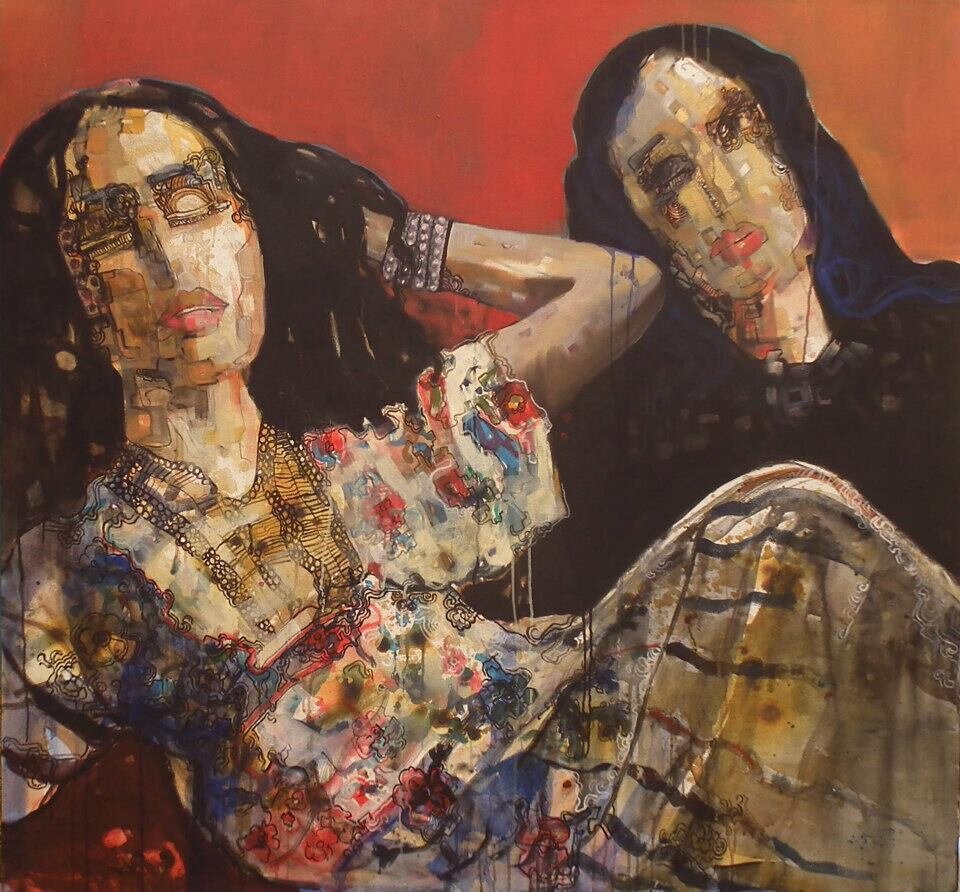
In rage, can crush a human being to pieces
But the whip’s passage brings him back to silence. Mariem Guellouz and Sélima Kebaïli
to international institutions remain ambivalent. The recent partnership between Asswat Nissa and the French Institute of Tunisia — which offered its walls to a fresco during an event around #MeToo — is an example of the stakes of power and legitimization of feminist movements through international organizations.


Join Our Community
TMR exists thanks to its readers and supporters. By sharing our stories and celebrating cultural pluralism, we aim to counter racism, xenophobia, and exclusion with knowledge, empathy, and artistic expression.
Learn more






